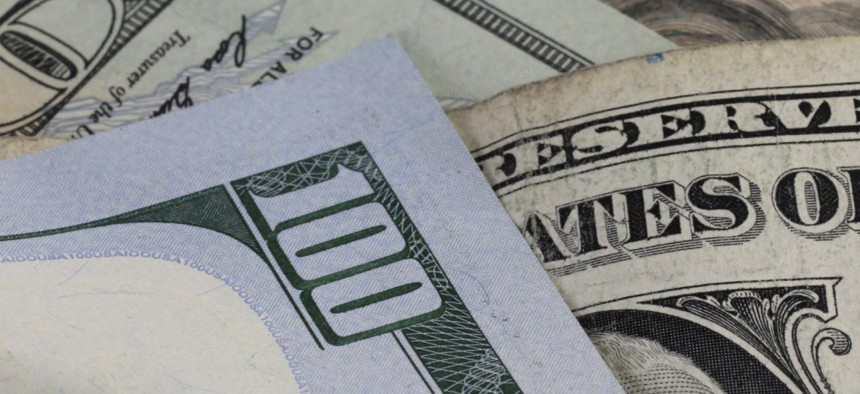
Douglas Sacha/Getty Images
Biden Proposes a 4.6% Raise for Federal Workers for 2023
If enacted, the figure would mark the largest pay increase for federal employees in two decades.
President Biden called for federal workers to receive their largest annual pay raise in 20 years Monday, releasing a budget proposal that would grant civilian employees an average pay increase of 4.6%.
The figure is nearly double the 2.7% average pay increase federal employees received in 2022 and a significant improvement over the 1.0% across-the-board pay increase they saw in 2021. Budget documents released by the White House do not specify how the figure will be split between across-the-board increases in basic pay and average boosts to locality pay, although traditionally 0.5% of the overall figure has been set aside for locality pay. Military service members also would receive a 4.6% pay increase as part of Biden's fiscal 2023 budget proposal.
In budget documents, the White House said that the pay raise is part of a larger effort to improve the effectiveness and equity of the federal government, arguing that ensuring that all federal jobs are “good jobs” empowers employees to do their best work.
“These efforts will help agencies retain qualified employees, empower workers to make their agencies better, create a pipeline of qualified leaders, and provide better services to the public,” the White House wrote. “The budget supports these objectives by ensuring that all those in federal jobs earn at least $15 per hour and providing a pay increase of 4.6% for civilian and military personnel.”
For years, federal employee groups had to fight tooth and nail for sizeable pay raises, as the Trump administration’s budgets pushed for pay freezes and cuts to non-salary benefits, while agencies underwent sequestration in the Obama administration. Biden’s fiscal 2023 budget includes no major proposals related to federal workers’ health care or retirement benefits.
The pay raise figure comes following months of high inflation across the American economy. The last time feds saw a pay raise of this size was in 2002, when the George W. Bush administration provided them the same level of increase.
Despite that, Biden’s plan is not the most generous proposal on federal employee pay this year. Earlier this year, Rep. Gerry Connolly, D-Va., and Sen. Brian Schatz, D-Hawaii, introduced legislation that would provide federal workers an average 5.1% pay raise in 2023. That plan would be split between a 4.1% across-the-board pay increase and a 1% average increase in locality pay.
Connolly lauded Biden’s budget proposal in a statement, although he made no mention of his own competing federal pay raise plan.
“With this budget, President Biden again makes clear that his commitment to the federal workforce is ironclad,” he said. “This would be the largest pay increase for federal workers in decades, and it would be critical to our efforts to attract and retain the next generation of federal employees.”
National Treasury Employees Union National President Tony Reardon described Biden’s pay raise proposal as a “great starting point,” but said his union still supports Connolly’s 5.1% raise plan.
“The White House proposal to give federal employees an average 4.6% pay increase in 2023 makes clear that this administration understands that improving salaries will help attract and retain highly skilled workers around the country, a sentiment that NTEU strongly supports,” he said. “That said, NTEU has already endorsed the Federal Adjustment of Income Rates Act calling for an average 5.1% pay adjustment for federal workers next year . . . Over the years, federal pay increases have barely kept up with inflation, and the average pay disparity between the federal government and the private sector, according to the last report by the Federal Salary Council, is 23.11%.”
The American Federation of Government Employees also said that it appreciated Biden’s proposal, although it prefers Connolly and Schatz’s 5.1% raise.
“The 4.6% pay raise for federal employees proposed by the White House is a good opening offer, but to bring federal salaries close to market rates and compensate for the recent surge in inflation, we ask Congress to approve the 5.1% increase under the FAIR Act,” said AFGE National President Everett Kelley.
But Ken Thomas, president of the National Active and Retired Federal Employees Association, was more unreservedly complimentary.
“With the 4.6% average federal pay increase proposed for 2023, Biden demonstrates appreciation for the millions of hardworking public servants who keep the government running day after day,” Thomas said. “If enacted, the 4.6% average pay increase would be the largest since 2002. The amount tracks with recent increases in private-sector pay and the expected military pay increase for the second consecutive year. Keeping up with private-sector pay growth is essential to maintaining the federal government’s ability to recruit and retain a highly qualified and effective workforce.”
NEXT STORY: The Numbers That Matter in 2022







